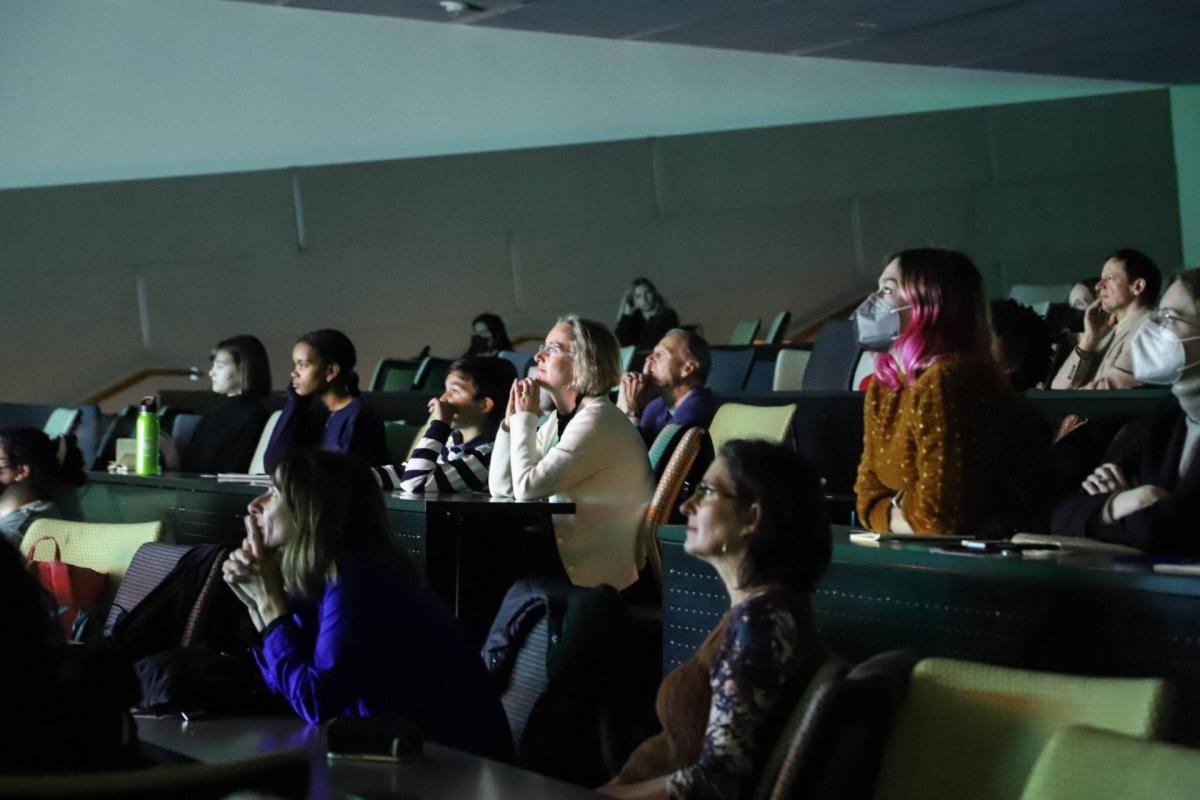
The annual Global Media Festival hosted by the School of Modern Languages is a critical voice for the humanities in sustainability studies at Georgia Tech. For its sixth iteration, professors across the Ivan Allen College of Liberal Arts organized six virtual and hybrid events from March 14 to April 19 under the theme “Peace, Justice, and Strong Institutions,” corresponding to United Nations Sustainable Development Goals (UN SDGs) #16. The events featured three celebrated filmmakers and nine languages across 11 countries. More than 250 people from Atlanta and abroad attended.
“The Global Media Festival helps students become global citizens by teaching them about sustainability issues across languages and cultures,” said Amanda Weiss, assistant professor of Japanese and festival director. “By introducing students to an international group of scholars, filmmakers, and artists, we explore the diverse cultural, social, and linguistic frameworks that inform sustainability issues around the world.”
More information about the Global Media Festival and upcoming announcements for the 2023 festival are available on the festival website.
Subtitling in the Age of Streaming
With streaming services allowing people to engage with content from all around the world, the need for accurate subtitles and translations is greater than ever before. For the opening event of this year’s festival, Keung Yoon Bae, assistant professor of Korean studies, planned a roundtable discussion to explore how streaming has changed the subtitling industry and the process of translating non-English-language films for subtitles.
“Besides the concerns that already exist for translating foreign languages into English, such as how to translate idioms and culturally specific expressions, panelists also pointed out that subtitle translation has to consider the screen performances and how subtitles match the emotions or actions being shown on screen,” Bae said. “Translation and subtitling are crucial for institutions to conduct their work, for communication across languages and cultures, and for the facilitation of peace and cooperation in the world.”
Panelists at the roundtable included Darcy Paquet, film critic, lecturer, subtitler, and founder of koreanfilm.org; Kerim Yasar, professor of Japanese literature and cinema at the University of Southern California and subtitler for Criterion; and Irhe Sohn, professor of modern Korea at Smith College.
Cities of Peace — From Atlanta to Hiroshima
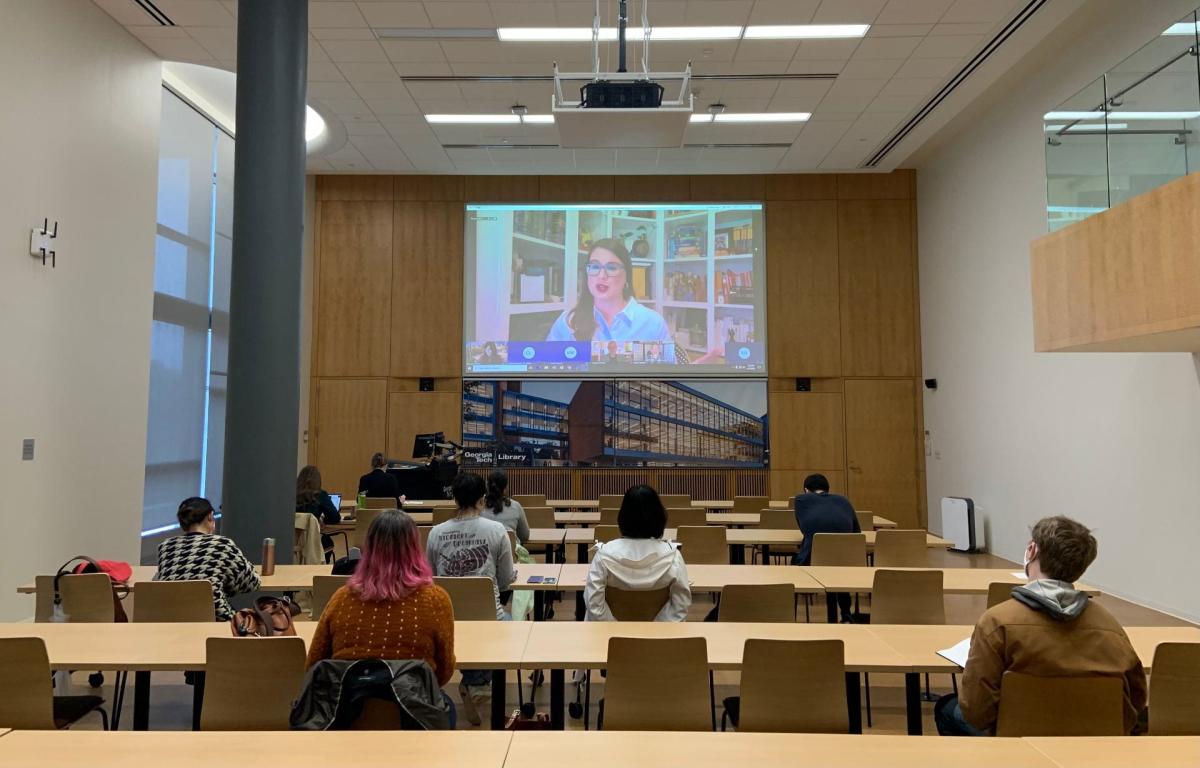
Weiss and Catherine Manci, public programming and community engagement specialist in the Georgia Tech Library, coordinated a roundtable discussing what it means to be a “city of peace” and how it differs in Atlanta and Hiroshima.
Meagan Martz, IAML-Japanese 2008 and senior associate director of principal gifts (Asia) at The Carter Center, and Robert “Bo” Jacobs, professor at the Hiroshima Peace Institute and the Graduate School of Peace Studies of Hiroshima City University, served as panelists for the discussion.
“Students and faculty were interested to hear our speakers’ insights on how individuals can contribute to building peaceful institutions through advocacy, staying informed, and making their voices heard,” said Gregory Zinman, moderator for the panel and associate professor in the School of Literature, Media, and Communication. “The panelists emphasized that establishing and maintaining peace is hard work and something that requires the coordination of individuals, communities, and principled institutions. Especially considering the ongoing war in Ukraine, a discussion of how and when to choose peace over conflict — and how to avoid conflict in the future — couldn’t have been timelier.”
Film Screenings and Conversations with Filmmakers
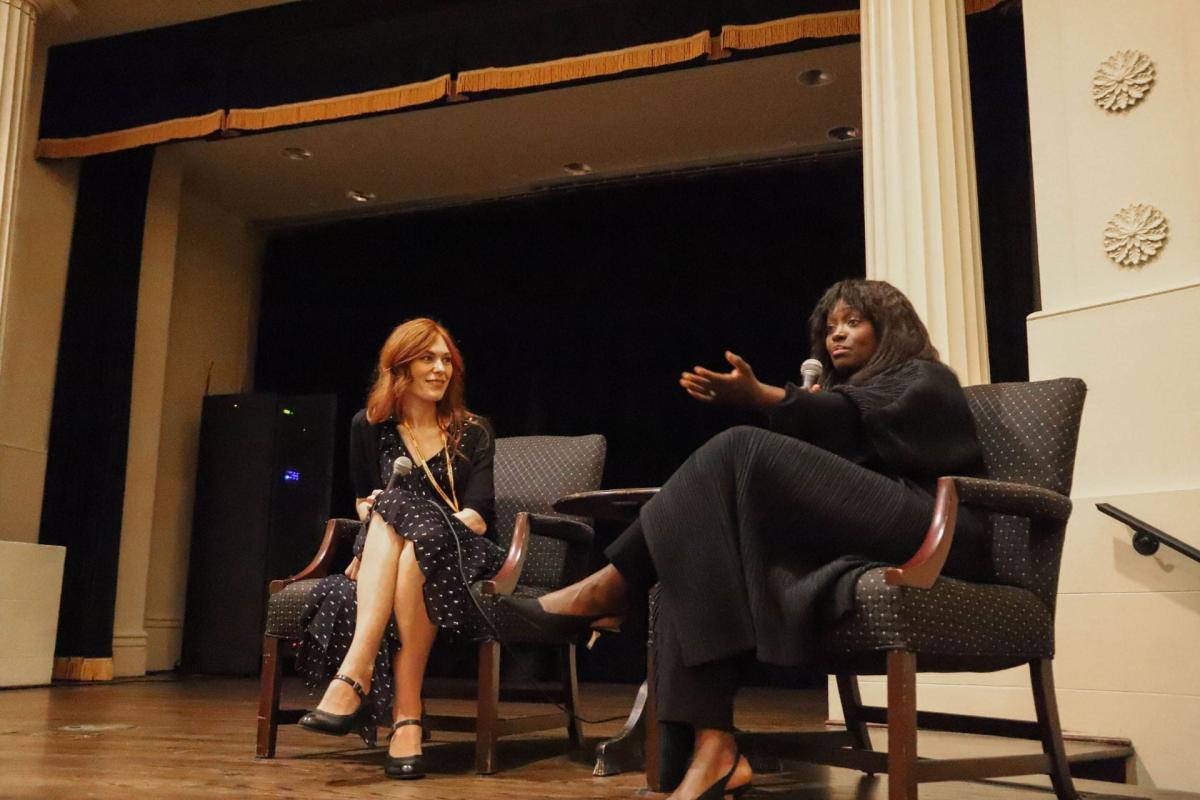
The festival organizers invited filmmakers from France, Germany, and the United States to screen their films and discuss them with students, faculty, and the public.
Stéphanie Boulard, associate professor of French, hosted the award-winning Senegal-born French actress, director, writer, and producer Aïssa Maïga for film screenings and Q&A sessions of her films Melanin and Above Water. Melanin explores the historical roots of systemic racism in front of and behind the camera in France, U.S., and Brazil. Above Water tells the story of a 12-year-old child in Niger who walks several kilometers daily to fetch water. The Global Media Festival served as the U.S. premiere for both films.
“These films are not only impressive in their cinematography and aesthetics, but they also have an extremely powerful message,” Boulard said. “They both show a captivating journey with strong women while addressing two crucial contemporary questions: the discrimination towards women and people of color in the movie industry as well as the global warming in Western Africa for which justice and strong institutions are needed. Finally, perhaps most importantly, they both show that initiatives and inspiring solutions do exist.”
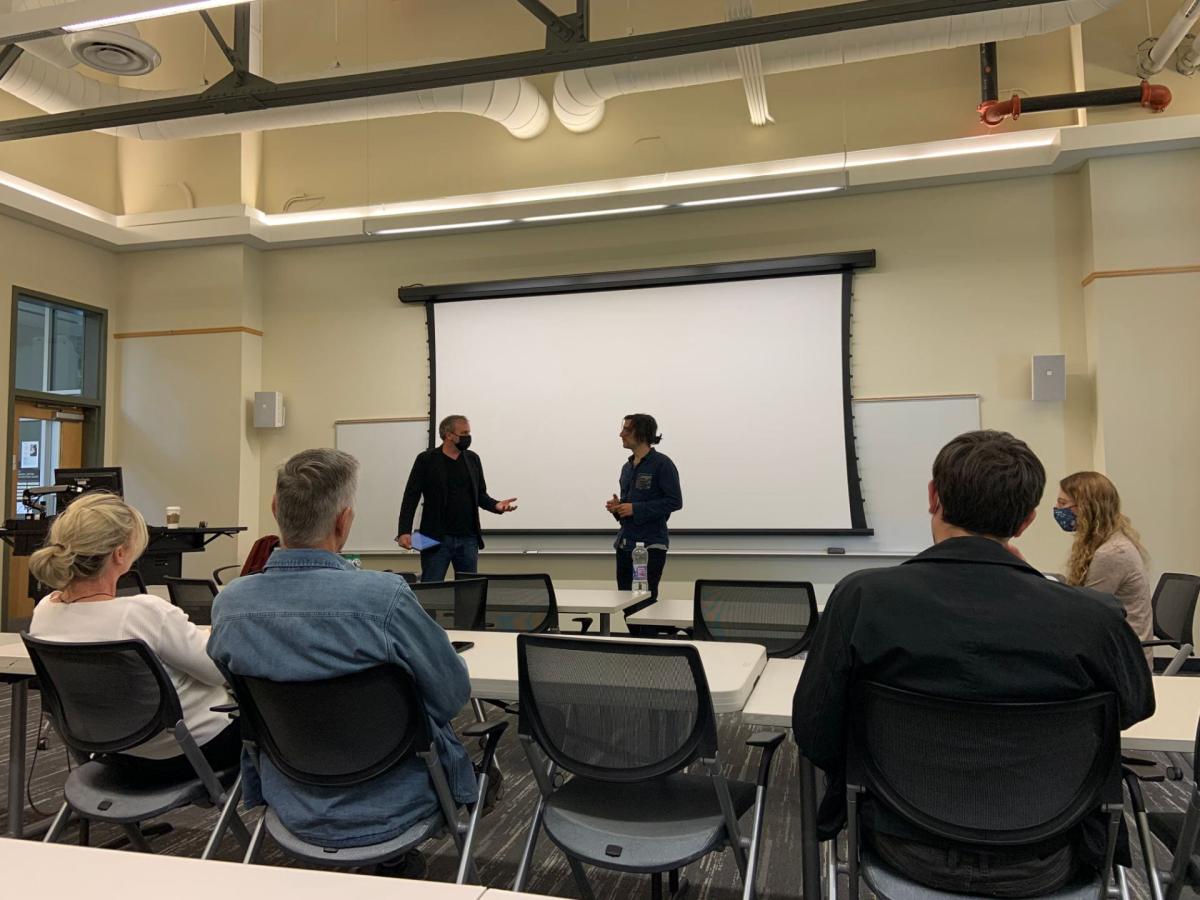
Jan Uelzmann, associate professor of German, arranged for a hybrid screening of the Academy Award-winning short film Fidelity and a Q&A session with director Ilker Çatak. Set during anti-government protests in Istanbul, the film follows the life of a Turkish couple that is suddenly thrown into turmoil due to their decision to give shelter to an anti-government protester.
“I chose this film because I was impressed by the way that it presented complex issues about ‘doing the right thing’ and standing up for your convictions in a localized yet universal way, and that it does so in less than 25 minutes,” Uelzmann said. “Interestingly, the film does not really take an obvious side but rather presents important problems that come up for a couple when choosing opposing sides during the protests, while we learn of, and are led to understand, their contrary motivations. This puts the interpretive load onto the viewer, which the audience found very stimulating during the discussion with Çatak.”
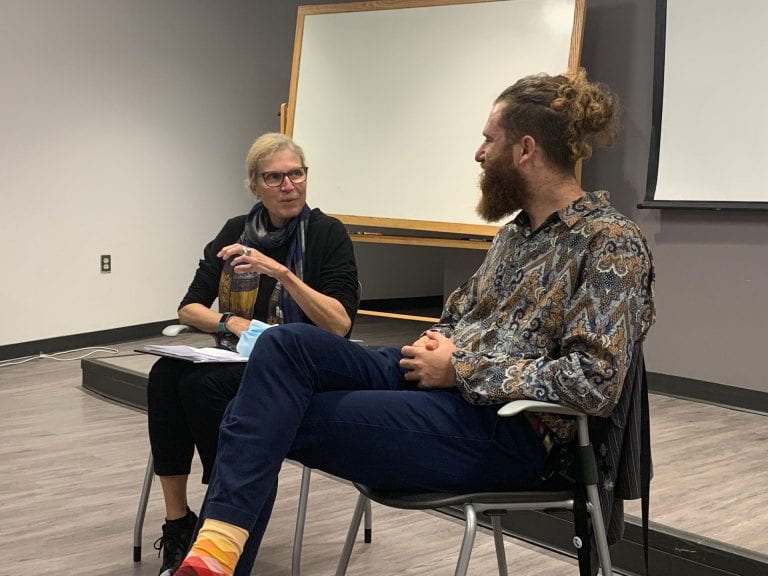
Ida Yoshinaga, assistant professor of science fiction film in the School of Literature, Media, and Communication, screened the family mystery-adventure movie Karmalink by Jake Wachtel as the festival’s closing event. While writer-director Wachtel is from the U.S., he shot on location in Cambodia and entirely in Khmer, the national language of Cambodia, with local Cambodians starring in the film and aiding in its production.
“For me, the film’s messages — worldwide poverty, the postcolonial effects of warfare and imperialism on Global South neighborhoods, and local families’ displacement due to economic development — spoke to the theme of peace, justice, and strong institutions,” Yoshinaga said. “Many of the students in my Oral Traditions to Screenplay course are budding filmmakers, so they enjoyed speaking with the director in an informal setting.”
Laynie McGrail, a third-year Applied Languages and Intercultural Studies major and student in Yoshinaga’s LMC 3215: Science Fiction Film and TV class, attended the Karmalink event, which she described as “an enlightening experience,” having not had the opportunity to learn about many Southeast Asian cultures such as Cambodia.
“There were moments when I felt that the story had nowhere left to go, but I was proven wrong almost every time,” McGrail said. “The story structure was unique in that it felt less linear than most narratives and more circular in nature, almost as if the director was attempting to bring the theme of reincarnation into the progression of the plot, itself. I’d love to see more stories conducted in this format to see how else it can be used and whether it could be a successful narrative structure for other genres as well.”
The Global Media Festival 2022 is a collaboration between partners and sponsors, including the School of Modern Languages; Atlanta Global Studies Center; Serve-Learn-Sustain; Georgia Tech Library; the French Consulate of Atlanta; Japan Foundation; the School of Literature, Media, and Communication; University of Georgia; and Villa Albertine.
